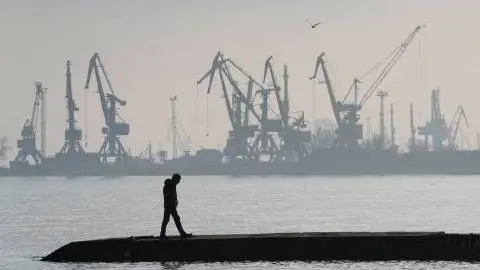Concerns that cryptocurrencies are a sanctions-busting tool seem exaggerated, for now
Crypto providers have to apply the global sanctions regime against Russia like any other business. We don’t see cryptocurrency as a major sanction evasion route today, though this could change in the future
Crypto companies are already required to enforce sanctions
Over the past week, we’ve seen the Ukrainian Vice Prime Minister, Mykhailo Fedorov, calling for a ban on crypto trading by all Russian-held wallet addresses. ECB president Christine Lagarde has called for a quick adoption of the EU’s “Market in Crypto Assets” regulatory proposal. And EU finance ministers have been discussing the risk of sanctions evasion via crypto assets. Is all the attention for crypto assets in the context of sanctions enforcement justified?
To start with, like any other legal entity, crypto-asset service providers (or CASPs, in EU parlance) are obliged to apply sanctions. They have to freeze assets and bar transactions from sanctioned people and entities. Indeed several large crypto exchanges have indicated they are doing so. National supervisors in, for example, the EU, UK and US are tasked with monitoring compliance, and you can read an example of that here.
So far, financial sanctions have been targeted. While the breadth and depth of sanctions are far-reaching (in particular the freeze of the Russian Central Bank’s reserves), no blanket ban has been issued on transactions with Russia. Cross-border payments, while severely curtailed, are still allowed under Western sanctions. Not all Russian banks are excluded from Swift, the global payment messaging service, at this stage. Sanctions certainly have severe repercussions impacting all Russians. Yet the point here is: thus far, Western policymakers have made the choice for sanctions not to apply fully across the board. From this perspective, as much as we understand the Ukrainian government having called for it, denying all Russians access to crypto services would not appear to be in line with the chosen sanctions approach so far.
That said, sanctions may change and some companies in other sectors did decide to (temporarily) halt business altogether with Russia. In addition, restrictions imposed by Russian authorities to limit capital outflows are another major hurdle to cross-border transactions by both businesses and private individuals.
The traceability of crypto transactions should not be underestimated
A different worry, discussed by EU finance ministers last week, is whether cryptocurrency is a significant loophole to evade sanctions and whether additional measures would be needed. Yet EU-based crypto companies are already subject to EU sanction law. While EU crypto asset regulation would be welcome for other reasons (we’ll return to the topic of the EU’s Markets in Crypto Assets Regulation in the near future), we struggle to see how accelerating crypto regulation in the EU would help sanctions enforcement.
We struggle to see how accelerating crypto regulation in the EU would help sanctions enforcement
An entirely different matter is how to handle crypto service providers that are based in jurisdictions with less advanced crypto asset regulation. An inherently global digital ecosystem like crypto requires a coordinated global approach to regulation and supervision, establishing e.g. minimum standards and basic information exchange among supervisors. This was already on the Financial Stability Board’s agenda.
Yet even if CASPs in far-away jurisdictions turned a blind eye to sanctioned persons transacting on their platform, chances are that these transactions will, either in real-time or after the fact, be noticed. The same applies if intermediaries are avoided altogether by transacting using “self-hosted” wallets. As on-chain forensic research has become more advanced over the years, it is becoming progressively more difficult to hide on the blockchain which is keeping a perfect history of transactions for all to see. Coins can, with some effort, be traced back to the very last “satoshi”, bitcoin's smallest unit. Recent reports of ransomware money being recaptured, and arrests made for crypto exchange hacks made years ago, attest to this progress. Hence we severely doubt whether cryptocurrency would allow a sanctioned person to transfer large sums of money in or out of Russia without it being noticed and responded to.
In the end, cryptocurrency markets may be a way for Russians to evade Western sanctions and/or Russian restrictions. But there are other ways too. Financial flows can, to a limited degree, be diverted to China and other jurisdictions that have not joined Western sanctions. Cash and gold could be carried across the border physically. From this perspective, imposing a generic ban on all Russians transacting on crypto exchanges seems inconsistent with sanction policies chosen in other areas.
Yet things are moving fast. Several western companies have made announcements of business closures that appear to go beyond what those sanctions require. Western sanctions themselves and their goals may evolve over time. Meanwhile, Russian countermeasures curtail the room for cross-border transactions too. So while the role of cryptocurrency in facilitating sanction evasion may appear limited today, that could change in the future.
This publication has been prepared by ING solely for information purposes irrespective of a particular user's means, financial situation or investment objectives. The information does not constitute investment recommendation, and nor is it investment, legal or tax advice or an offer or solicitation to purchase or sell any financial instrument. Read more
Download
Download article
7 March 2022
A global power struggle This bundle contains 9 Articles